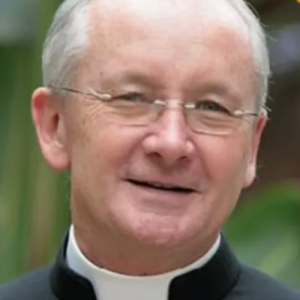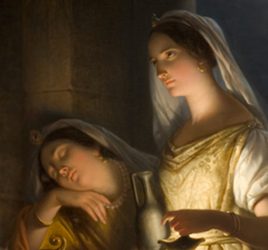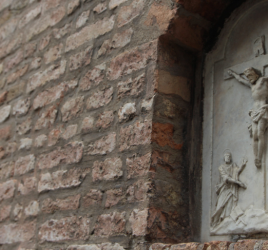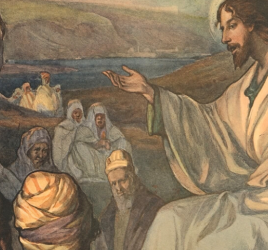
Proclaiming Christ as Our King
“When the Son of man comes in his glory, escorted by all the angels, then he will take his seat on his throne of glory. All nations will be assembled before him, and he will separate people one from another, as the shepherd separates sheep from goats. He will place the sheep on his right hand, and the goats on his left. Then the King will say to those on his right hand, ‘Come, you whom my Father has blessed, take as your heritage the kingdom prepared for you since the foundation of the world. For I was hungry and you gave me food, I was thirsty and you gave me drink, I was a stranger and you made me welcome” (Mathew 25:31-35).
Today is the Solemnity of Christ the King. It’s a feast that was established by Pius XI in 1925 and later, after the Second Vatican Council, it was placed at the close of the liturgical year. We finish the liturgical year in a strong fashion, proclaiming Christ as Our King. In many places in Scripture, Our Lord talks about His kingdom, specifically in the parables of the kingdom:
The kingdom of heaven is “like a grain of mustard seed, which a man took and sowed in his field.” It’s like a “leaven, which a woman took and hid in three measures of meal.” It’s like a “treasure hidden in a field.” It’s like “a merchant seeking good pearls, who, when he finds one pearl of great price, went and sold all that he had and bought it.” It’s like “a net cast into the sea, gathering all kinds of fish.” Our Lord gives us all sorts of images about His kingdom (Matt. 13:31-33,44-47).
He also says in various places: “My kingdom is not of this world” (John 18:36). Interesting phrase for us to remember from time to time. We’re passing through. Here we have no permanent city. We are here to bring about the Kingdom of God on earth, but then to go and enjoy His Kingdom forever and forever in the company of the King.
St. Paul says to the Corinthians, “Christ has been raised from the dead, the first fruits of those who have fallen asleep. … For as in Adam all die, so also in Christ shall all be made alive. For each in his own order: Christ, the first fruits; then comes the end when he delivers the kingdom to God the Father after destroying every rule and every authority and power. For he must reign until he has put all his enemies under his feet” (1 Cor. 15:20-25). We are children of God, but we’re also children of the King.
When Psalm 2 says to us, “Ask of me and I will give you the nations for your inheritance, the very ends of the earth for your domain” (Ps. 2:8), Christ speaks about a kingdom, but He also tells us that “the Kingdom of God is within you” (Luke 17:21). God comes to live in our soul in grace. He will come and make our abode in you (John 14:23). God, who is love (1 John 4:8,16), comes to live in our heart in grace and to reign in our heart; and in that way to reign in the world, to exert His social influence, in my marriage, in my family, in my office, in my environment, in my club. This is the basis of the apostolate of the ordinary person in the middle of the world.
In the Preface of Christ the King, it describes what type of kingdom it is that Christ wants to bring about: “a kingdom of truth and life, a kingdom of holiness and grace, a kingdom of justice, love, and peace.” Beautiful things. The feast of Christ the King is very beautiful. The image of Christ reigning in the world, reigning forever. Christ conquering. Christ came into the world to live and to die, but through that death, to learn how to reign in hearts, in minds, in souls, in society.
The vocation and role of the layperson is very much to help Christ to reign in all temporal matters.
Many years ago, the King of England was going on a visit to a small rural village and all the primary school children were out to greet him, lined along the road. After the King had passed by a little six-year-old girl was found crying. The teacher asked her, “But what’s the matter—did you not see the King?” And she said, “Yes, I saw him all right, but he didn’t see me.” She was crying because she hadn’t been seen by the King.
With Our King, we know that doesn’t happen. We’re carried in the palm of a hand of a God who loves us, of a King who loves us. He’s looking at us all the time. Our name is tattooed on His hand. Every time He looks at His hand, He sees our name. “I will call you by your name” (Isa. 43:1). The Good Shepherd calls the sheep by their name (John 10:3).
Pope Benedict XVI has liked to mention how Christ is a King who dominates with love. He does not impose himself but rather respects human freedom. His royalty is not like the great ones of the world. It’s the power to defeat evil and death and to awaken hope, even in the hardest of parts.
The Feast of Christ the King is also a feast of hope. We know that He will come to judge the living and the dead. His Kingdom will last forever. And we want Christ to reign. We try to express that with our words, with our actions every hour of our working day.
This article is an excerpt from the meditation Christ the King on the podcast Fr. Conor Donnelly Meditations. Tune in on Apple Podcasts, Spotify, and your favorite podcast app.
Cover Image: The Great Last Judgement (circa 1617) by Peter Paul Rubens




